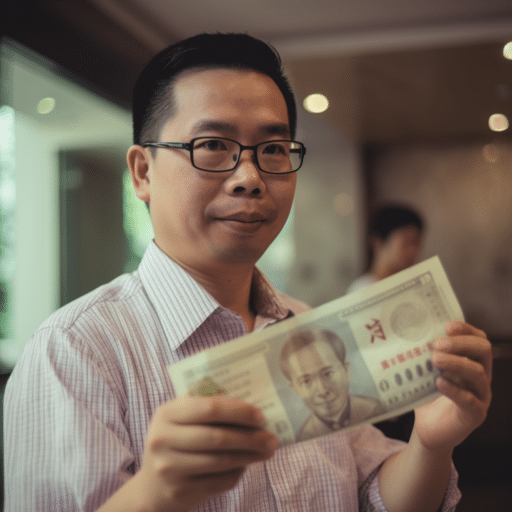When it comes to expat savings accounts in China, understanding the local financial landscape is a challenge.
This blog aims to shed light on the important aspects of expat savings accounts in China and how they can fit into your financial planning strategy.
If you want to invest as an expat or high-net-worth individual, which is what I specialize in, you can email me (hello@adamfayed.com) or use WhatsApp (+44-7393-450-837).
What Are Expat Savings Accounts in China?
Since China opened its doors to the world in the late 70s, the influx of expats in the country has grown steadily. The banking system had to adapt to cater to these new customers, leading to the inception of expat savings accounts. These are special types of savings accounts provided by Chinese banks, both local and international, designed to meet the unique needs of expats for asset planning. They provide a secure place for expats to deposit and grow their earnings while residing in China.
Importance of Expat Savings Accounts
Expat savings accounts are important because they facilitate the daily financial activities of expats in China. These accounts allow easy access to cash for daily spending, while also offering a secure place to accumulate savings. Without an expat savings account, managing finances in China can become a complex and time-consuming process.

Benefits and Drawbacks of Expat Savings Accounts
The benefits of expat savings accounts in China are manifold. These accounts make it possible to easily perform bank transactions, receive salaries, pay bills, and accumulate savings. Some accounts even offer interest, which allows your money to grow over time.
However, there are drawbacks as well. For example, some Chinese banks may not offer English language services, making account management challenging. Additionally, withdrawing money from ATMs that are not associated with your bank can often result in fees.
How to Open an Expat Savings Account in China?
When preparing to open an expat savings account in China, gather the necessary documents first. You typically need a valid passport, a valid visa, proof of residence, and a work permit or certificate of employment. Ensure you have original documents and copies for the process.
Step-by-Step Process
Here’s a step-by-step guide to opening an expat savings account:
- Visit your chosen bank in person.
- Provide all required documents and complete an application form.
- If required, make an initial deposit into your account.
- Set up your online banking credentials and receive your debit card.
The bank may require you to set up a mobile number or an email address for account notifications and communication.
Time-frame for Account Opening
Typically, opening an expat savings account takes a few days, though it could take longer depending on the bank’s specific procedures and the completeness of your submitted documents. After your account gets approved, you’ll receive a passbook or a debit card, marking the official opening of your Expat Savings Account.
Can Expats Open Savings Accounts with Any Chinese Bank?
The process of opening an expat savings account in China isn’t the same across all banks. Let’s delve into this more deeply.
List of Banks That Allow Expat Savings Accounts
Several Chinese banks offer expat savings accounts. Here are some of the most popular ones:
- Bank of China: Renowned for its comprehensive expat services and easy account opening process.
- Industrial and Commercial Bank of China (ICBC): Known for excellent customer service and competitive interest rates.
- China Construction Bank (CCB): A good choice if you’re looking for easy online banking facilities.
- HSBC: Ideal if you want a global bank with strong local presence and expat-friendly services.
Local vs International Banks: Pros and Cons
Local banks offer higher interest rates on savings accounts. They also have extensive local branches and ATMs for easy access. However, their customer service might not be as efficient or English-friendly. Their online banking services might also be less user-friendly for expats.
On the other hand, international banks offer robust online banking services and English-speaking customer service. They also provide more expat-friendly services like global money transfers. But, their interest rates might be lower than local banks. They might also have fewer branches and ATMs locally.
What Are the Features of Expat Savings Accounts in China?
Navigating the features of expat savings accounts in China is vital for making the most of your money. Let’s break it down:
Account Types and Benefits
There are several types of expat savings accounts in China. These include regular savings accounts, time deposit accounts, and foreign currency accounts.
- Regular Savings Account: This is the standard account type that offers easy access to funds and a passbook for tracking transactions.
- Time Deposit Account: These accounts typically offer higher interest rates, but your funds are locked for a specified period.
- Foreign Currency Account: These accounts allow you to hold and manage funds in foreign currencies, providing a hedge against foreign exchange fluctuations.
Interest Rates and Terms
The interest rates for expat savings accountsin China vary depending on the bank and the account type. Regular savings accounts offer lower interest rates, typically ranging from 0.35% to 0.50% per annum. Time deposit accounts, on the other hand, offer higher rates, which can go up to 3.75% for one-year deposits.
Access to Funds and ATM Availability
All banks that provide expat savings accounts offer ATM cards, allowing you to withdraw cash and make transactions conveniently. In addition, you can access your funds through online and mobile banking platforms. Remember that while local banks have more ATMs across China, international banks offer broader global ATM access.
What Are the Service Charges and Fees Associated with Expat Savings Accounts?

Expat savings accounts in China, like any banking service, come with their own set of fees and charges. You need to be aware of these charges to manage your account effectively.
Common charges associated with expat savings accounts may include account maintenance fees, ATM withdrawal fees, especially from ATMs of other banks, and fees for international wire transfers.
Some banks may also charge fees for services like paper statements or cheque books. Always ensure to review the fee structure of the bank you are considering.
Tips to Minimize or Avoid Fees
Fees can sometimes take a significant bite out of your savings. Here are a few tips to minimize or avoid these fees:
- Maintain the Minimum Balance: Most banks waive off maintenance fees if you keep a certain minimum balance in your account. Make sure you are aware of this limit and try to keep your balance above it.
- Use Your Bank’s ATMs: Using your own bank’s ATMs for cash withdrawals can help you avoid extra charges.
- Leverage Online Services: Opt for electronic statements and online banking services whenever possible to avoid fees associated with paper statements and other manual services.
- Negotiate with Your Bank: Depending on your relationship with the bank, you might be able to negotiate lower fees. Don’t hesitate to discuss this with your bank.
- What Are the Tax Implications for Expat Savings Accounts in China?
Domestic Taxation Policies
China has specific taxation policies for both residents and non-residents. As an expat, if you’ve resided in China for more than 183 days in a tax year, you’re considered a resident for tax purposes and your worldwide income may be subject to tax.
The interest earned on your expat savings accounts in China could be taxed. It’s crucial to understand these domestic taxation policies to manage your account effectively.
Double Taxation Agreements
China has Double Taxation Avoidance Agreements (DTAAs) with several countries. These agreements prevent your income from being taxed twice — once in China and once in your home country.
If your home country has a DTAA with China, you may be exempt from paying taxes on the interest earned from your expat savings account in your home country. Always consult a tax advisor to understand the specific provisions of these agreements.
Tax Planning Tips for Expats
Managing your tax liability effectively is a crucial part of financial planning for expats. Here are a few tips:
- Understand the Tax Laws: Familiarize yourself with the tax laws in both China and your home country.
- Seek Professional Advice: A tax advisor with experience in international tax laws can provide valuable insights and help you optimize your tax liability.
- Keep Accurate Records: Make sure you keep detailed and accurate records of all your income and financial transactions.
Remember, managing your expat savings account effectively involves understanding and planning for both service charges and taxation.
How Are Expat Savings Accounts in China Regulated?
Chinese banking system upholds strict regulatory standards for all bank accounts, including expat savings accounts, ensuring the protection of your money and your rights as a consumer.
China’s Banking Regulatory Commission (CBRC) oversees the regulation of expat savings accounts in China. The CBRC ensures that banks follow all required rules and guidelines, including providing accurate information about account fees, interest rates, and terms and conditions.
Account Insurance and Protection
The Deposit Insurance Fund Management Corporation of China protects expat savings accounts up to a certain limit, currently set at 500,000 yuan (as of 2023). This means if the bank faces insolvency, your expat savings account remains secure up to the insured limit.
Customer Rights and Dispute Resolution
Banks are obligated to protect your rights as a customer, which includes providing clear account statements, respecting your privacy, and offering prompt and efficient customer service. If you face any issues with your expat savings account, the bank should have a dispute resolution process in place. You can also escalate your concerns to the CBRC if necessary.
How to Manage Your Expat Savings Account?
Managing your expat savings account in China efficiently requires a balance of digital convenience and smart money practices.
Online and Mobile Banking Features
Most Chinese banks offer online and mobile banking features for expat savings accounts. You can check your account balance, make payments, transfer funds, and even deposit checks using your smartphone. Using these features not only makes account management easier but also helps you track your savings growth and spending habits.
Transferring Money In and Out of China
If you need to transfer money to or from your expat savings account, most banks offer wire transfer services. However, keep in mind that China has strict capital controls, so there might be limits on how much money you can transfer at once. It’s also crucial to be aware of any fees associated with these transfers.
Tips for Efficient Account Management
Managing your expat savings account efficiently involves regular monitoring of your account activities, setting up automatic payments for recurring bills, and maintaining a healthy balance to avoid any minimum balance fees.
It’s also wise to regularly review the bank’s fee schedule and interest rates for your expat savings account to ensure you’re maximizing your savings potential.
Can You Convert the Currency in Your Expat Savings Account?
Managing your finances as an expat involves dealing with currencies. Let’s explore the currency aspects of your expat savings accounts in China.

Expat savings accounts in China typically operate using the local currency, the Yuan (CNY). However, China enforces certain currency restrictions that limit the amount of money you can convert into and out of Yuan.
It’s crucial to understand these regulations to avoid running into difficulties when making large transactions or when you need to convert a significant amount of money into another currency.
Process and Charges for Currency Conversion
Converting currency in your expat savings account is a simple process. You need to visit your bank, request a conversion, and provide necessary documentation, like your passport and proof of income.
However, banks may charge a fee for currency conversion, usually a percentage of the total amount you’re converting. It’s advisable to inquire about these fees beforehand to avoid unexpected charges.
Impact of Currency Fluctuations on Your Savings
Currency fluctuations can have a significant impact on your expat savings accounts in China. As the exchange rate between Yuan and your home currency changes, the value of your savings can increase or decrease.
It’s essential to keep an eye on these fluctuations to understand their potential impact on your savings and make informed decisions about when to convert your money.
What If You Want to Close Your Expat Savings Account in China?
Closing your expat savings account in China involves a straightforward process. Let’s look at the steps involved, the fees, and what happens when you want to transfer your money out of China.
Process and Timeline for Account Closure
To close your expat savings account, visit your bank with your account details and a valid form of identification. Inform them of your intention to close the account. Usually, the bank carries out your request instantly, but the exact timeline may vary depending on the bank’s policies.
Early Closure Fees
Some banks may charge a fee if you decide to close your expat savings account within a certain period after opening it, typically within six months to a year. Make sure to inquire about potential early closure fees to avoid unexpected charges.
Transferring Funds Out of China Post-Account Closure
Transferring funds out of China after closing your expat savings account requires you to adhere to China’s currency control rules. You must provide documentation proving that you’ve fulfilled your tax obligations. Once you meet the requirements, the bank can process your fund transfer.
Conclusion
Navigating expat savings accounts in China involves understanding the regulations, recognizing the features and benefits, and staying informed about currency conversion and closure procedures.
As you prepare to manage your finances as an expat in China, remember that knowledge is power – the more you understand about how your savings account works, the better equipped you are to make sound financial decisions. Keep this guide handy as you journey through your financial endeavors in China, and don’t hesitate to seek expert advice when necessary.
Pained by financial indecision?

Adam is an internationally recognised author on financial matters with over 830million answer views on Quora, a widely sold book on Amazon, and a contributor on Forbes.



